

SOPA and PIPA 2012. #FactsWithoutWikipedia: Twitter Users Fill Wikipedia Blackout Void With Hilarious 'Facts' (TWEETS) After Wikipedia shut down at midnight on Tuesday, Jan. 18, students everywhere began to panic about how they were going to do their homework.
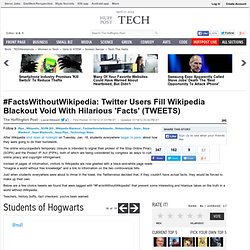
The online encyclopedia's temporary closure is intended to signal their protest of the Stop Online Piracy Act (SOPA) and the Protect IP Act (PIPA), both of which are being considered by congress as ways to curb online piracy and copyright infringement. Instead of pages of information, visitors to Wikipedia are now greeted with a black-and-white page reads "Imagine a world without free knowledge" and a link to information on the two controversial bills.
Just when students everywhere were about to throw in the towel, the Twitterverse decided that, if they couldn't have actual facts, they would be forced to make up their own. Below are a few choice tweets we found that were tagged with "#FactsWithoutWikipedia" that present some interesting and hilarious takes on the truth in a world without Wikipedia. Students of Hogwarts 18 of 19. The best Sopa protests online – in pictures. SOPA In A Nutshell. SOPA: The Internet Blacklist Bill. SOPA and PIPA. PROTECT IP Act Breaks the Internet. I am writing to you as a voter in your district.
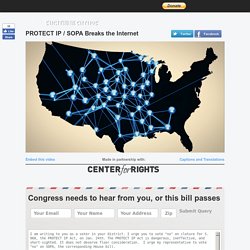
I urge you to vote "no" on cloture for S. 968, the PROTECT IP Act, on Jan. 24th. The PROTECT IP Act is dangerous, ineffective, and short-sighted. How to credit? just check the poster… Dannysullivan: Found way to communicate w... Permission To Speak: Conservative Lord suggests that government “may end up regulating” the blogosphere « Richard Wilson's blog. Last month Liberal Conspiracy reported on plans by David Hunt, a Conservative Member of the House of Lords, and the new head of the Press Complaints Commission, to “invite political bloggers to volunteer for regulation by the PCC’s replacement”.
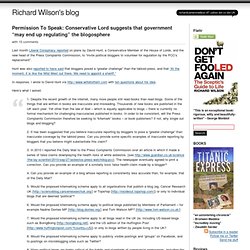
Hunt was also reported to have said that bloggers posed a “greater challenge” than the tabloid press, and that “At the moment, it is like the Wild West out there. We need to appoint a sheriff.” In response, I wrote to David Hunt via with ten questions about his idea. Here’s what I asked: 1. I’m pleased to say that I’ve now received a reply. Dear Mr Wilson,Thank you for your letter dated 19th December. Readers will note that David Hunt has sidestepped a number of my questions but let’s focus on what he does say. Over 40 Internet Companies Come Out Publicly Against SOPA (Including Us) Since the list of 120 or so SOPA supporting companies hit the Internet yesterday, the lines have been drawn; People are publicly promising to pull thousands of domains from domain registrar Godaddy after it appeared on the list as a supporter.
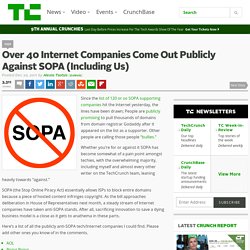
Other people are calling those people “bullies.” Whether you’re for or against it SOPA has become somewhat of a pain point amongst techies, with the overwhelming majority, including myself and almost every other writer on the TechCrunch team, leaning heavily towards “against.” SOPA (the Stop Online Piracy Act) essentially allows ISPs to block entire domains because a piece of hosted content infringes copyright. As the bill approaches deliberation in House of Representatives next month, a steady stream of Internet companies have taken anti-SOPA stands. After all, sacrificing innovation to save a dying business model is a close as it gets to anathema in these parts. What You Need to Know About SOPA in 2012. The Internet is in an uproar over the Stop Online Piracy Act.
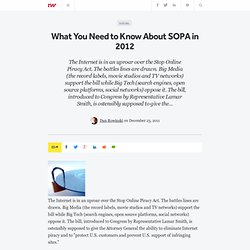
The battles lines are drawn. Big Media (the record labels, movie studios and TV networks) support the bill while Big Tech (search engines, open source platforms, social networks) oppose it. The bill, introduced to Congress by Representative Lamar Smith, is ostensibly supposed to give the Attorney General the ability to eliminate Internet piracy and to "protect U.S. customers and prevent U.S. support of infringing sites.
" How SOPA Affects Students, Educators, and Libraries. Big media groups like the MPAA and the RIAA have historically targeted college campuses with “anti-piracy” measures, and the Stop Online Piracy Act (SOPA) — the blacklist bill they’re trying to push through Congress — is no exception.

The bill’s supporters insist that it targets only “rogue” foreign sites dedicated to piracy, but its vague language and overbroad enforcement methods all but ensure it could be used to stifle student and educator speech. Open educational resources Some sites with reason to be particularly concerned are international communities dedicated to “open educational resources” (OERs), which are created to be shared, built upon, and used in education. Sites like the Japan Opencourseware Consortium or Universia, which offer resources from more than 1,000 universities and represents over 10 million students, could fall into this category. Libraries and librarians They’re not alone. Fair use for students and educators. How SOPA could actually break the internet. We’ve discussed the Stop Online Piracy Act (SOPA) at some length, but haven’t said much about the serious technical problems with the bill as its written.

Depending on how its implemented, SOPA could demolish the cohesive structure of the internet by damaging the core functionality of the Domain Name Service (DNS) system. As written, SOPA tasks ISPs with preventing US internet users from accessing a site that’s been deemed to contain infringing content by preventing their browsers “from resolving to that domain name’s Internet Protocol address.” The question is, how might that sort of blocking actually be accomplished? Existing legal structures already allow the government to petition Verisign to remove the DNS records that resolve to any given website (we’ll use pirates.com as an example).
The government could also seize pirates.com under existing asset forfeiture law. Stop SOPA! A Plea from the Inventors of the Internet. What happens when you combine an overzealous drive to fight Internet piracy, with elected representatives who don’t know the difference between DNS, IM, and MP3?

You get SOPA--draconian legislation that far exceeds its intended scope, and threatens the Constitutional rights of law abiding citizens. And it may just pass. An open letter to Congress written by luminaries of the Internet, such as Vint Cerf--co-designer of TCP/IP, and Robert W. Taylor--founder of ARPAnet among others, implores Congress to back off and squash both SOPA, and its sibling PIPA legislation. The letter states, “If enacted, either of these bills will create an environment of tremendous fear and uncertainty for technological innovation, and seriously harm the credibility of the United States in its role as a steward of key Internet infrastructure.”
The letter goes on to ominously caution Congress. Paul Tassi, a sometimes writer for Forbes, makes his primary living from a website he co-founded. It is almost 2012. MythBuster Adam Savage: SOPA Could Destroy the Internet as We Know It. Right now Congress is considering two bills—the Protect IP Act, and the Stop Online Piracy Act (SOPA)—that would be laughable if they weren't in fact real.
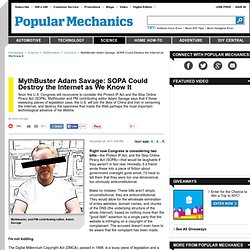
Honestly, if a friend wrote these into a piece of fiction about government oversight gone amok, I'd have to tell them that they were too one-dimensional, too obviously anticonstitutional. How SOPA would affect you: FAQ. When Rep.

Lamar Smith announced the Stop Online Piracy Act in late October, he knew it was going to be controversial. But the Texas Republican probably never anticipated the broad and fierce outcry from Internet users that SOPA provoked over the last few months. It was a show of public opposition to Internet-related legislation not seen since the 2003 political wrangling over implanting copy-protection technology in PCs, or perhaps even the blue ribbons appearing on Web sites in the mid-1990s in response to the Communications Decency Act. Consider the concerted protest on January 18 by high-profile Web companies and organizations. Wikipedia's English-language pages, for instance, went completely black, while Google put a big black box over the prominent logo on its home page, with a link to a page from which users could sign a petition entitled "Tell Congress: Don't censor the Web.
"